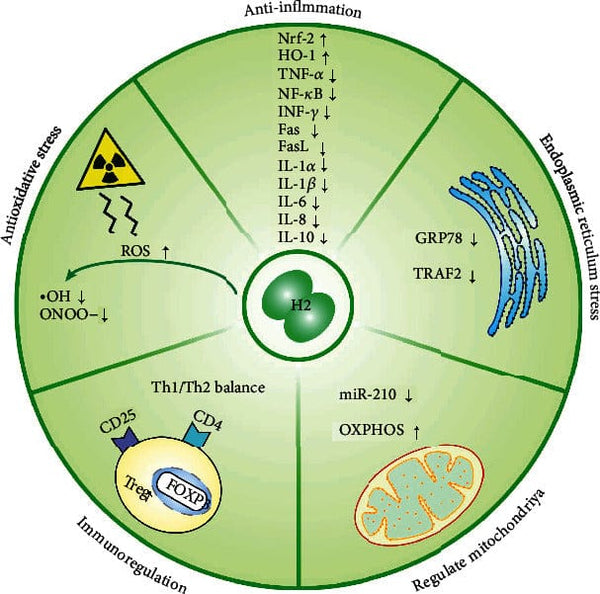Molecular hydrogen (H2 or MH) is the most lightweight gas and the lightest and most abundant chemical element. It can act as an antioxidant by suppressing free radical chain reactions, thereby reducing the production of reactive oxygen species (ROS). The therapeutic application of H2 as a free radical catalyzer was first documented in the 1970s. It was hypothesized that the underlying mechanism was through hydroxyl radicals scavenging by exothermic reaction (a chemical reaction in which less energy is needed to break bonds in the reactants than is released when new bonds form in the products) of H2 + ·OH = H2O + H· followed by H· + O2- = HO2- reaction using hyperbaric hydrogen therapy.
The antioxidant advantages of molecular hydrogen include:
- High biomembrane penetration and intracellular diffusion capability enable it to reach subcellular compartments like mitochondria
- Selectively scavenging the deleterious hydroxyl radical (·OH) while preserving other important reactive oxygen and nitrogen species for normal signaling regulation
Since the landmark publication in Nature Medicine in 2007 (by Ohsawa et al.), research on molecular hydrogen medicine has been blooming worldwide. In 15 years of molecular hydrogen research, there have been over 2,000 published scientific articles on the health benefits of various methods of hydrogen consumption. Publications on human trials using hydrogen as a therapeutic agent are close to 130. Three administration forms of molecular hydrogen, namely 1–4 % hydrogen gas inhalation, hydrogen-rich saline intraperitoneal injection/intravenous infusion and oral intake of hydrogen-saturated water, have been commonly used in hydrogen medical research. About half of them make up for drinking hydrogen water. Based on research by Liu et al. (2014) done on rats, hydrogen concentration reaches its peak 5 min after oral (drinking) administration.
Mechanisms of the action of molecular hydrogen in the body
- Anti-inflammatory effects
- Regulation of oxidative stress
- It may act as a mitohormetic effector to mediate the beneficial effects on the body through hormetic mechanisms (mitohormesis)
- Regulation of endoplasmic reticulum stress
- Regulation of mitochondria
- Immune system effects
- Reduce the production of immune-active substances
- Effects on cell death
- Prevention of apoptosis
- Regulation of autophagy
- Regulation of pyroptosis (an inflammatory programmed cell death pathway that protects multicellular hosts from invasive pathogens, including microbial infections)
- Regulation of ferroptosis (a form of regulated cell death)

Image: Biological effects of H2.
Source: Yang, M. et al. (2020). Hydrogen: a novel option in human disease treatment. Oxidative Medicine and Cellular Longevity 2020: 8384742.
Molecular hydrogen also has remarkable preventive and therapeutic applications in various diseases and organ systems (see table below). However, most of the studies and their results represented in the table are from animal models.
|
Organ system |
Molecular hydrogen mechanisms |
|
Respiratory system |
|
|
Cardiovascular system |
|
|
Nervous system |
|
|
Digestive system |
|
|
Reproductive system |
|
|
Urinary system |
|
|
Motor system (the set of central and peripheral structures in the nervous system that support motor functions) |
|
|
Sensory system |
|
|
Cancer |
|
|
Metabolic syndrome |
|
Recent human research findings of molecular hydrogen on metabolic health, physical performance and recovery
These findings below are from using molecular hydrogen enriched water. If some other administration way is used, it has been mentioned separately.
Athletic performance and recovery:
- Enhances endurance and reduces (muscular) fatigue
- May improve exercise capacity (VO2max) and lower submaximal heart rate
- Protects against free radical injury in athletes and modulates redox status during consecutive days of strenuous exercise (balances oxidative stress response)
- Improves ventilatory, perceptual and lactate responses to exercise
- Reduces muscular damage and soreness (H2 water bath and/or oral hydrogen water)
- Improves recovery from exercise (reduces inflammation and oxidative stress)
Metabolic health:
- Improves lipid and glucose metabolism in patients with type 2 diabetes OR impaired glucose tolerance
- Improves lipid markers and antioxidant status in metabolic syndrome, body composition and mitochondrial function
- Improves lipid markers in patients with hypercholesterolemia
- Improves peripheral endothelial function
- Improves liver enzyme profile in patients with NAFLD (non-alcoholic fatty liver disease) and alleviates NAFLD in moderate-severe patients (H2 inhalation)
Conclusion
The scientific evidence for the broad biological effects of molecular hydrogen has been increasing over the past 15 years. MH regulates inflammation, oxidative stress, autophagy, programmed cell death (apoptosis), and the aging process as well as improves physical performance and recovery. Animal experiments and clinical trials have demonstrated the protective effects of hydrogen on many organs and systems. However, the exact and detailed molecular mechanisms underlying the protective effects of molecular hydrogen remain to be validated.
While other hormetic stressors need to be monitored to prevent them from becoming harmful (such as heat, cold, exercise and many chemicals), the safety of molecular hydrogen is extremely high. The safest and easiest way to use molecular hydrogen is by taking oral water-dissolving H2 tablets.
///





